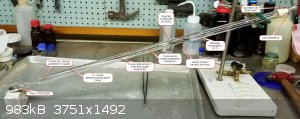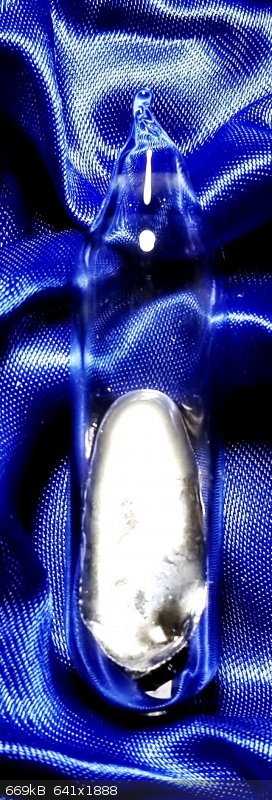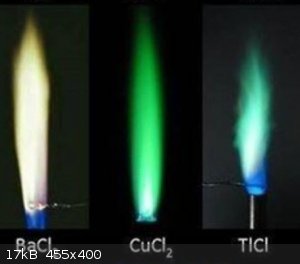Dan Vizine
National Hazard
   
Posts: 628
Registered: 4-4-2014
Location: Tonawanda, New York
Member Is Offline
Mood: High Resistance
|
|
A process to produce silvery thallium ampoules
Many of the low-melting metals require customized equipment to give satisfactory purification results.
Liquid thallium is fairly viscous, reacts rapidly with oxygen and contains difficult-to-filter impurities. For these reasons it's difficult to prepare
high quality samples of this metal simply by melting and filtering through typical filter material under argon. A typical purification apparatus that
can yield excellent results is shown below. The tube is torch dried, argon-purged and charged with thallium metal. When torch-melting melting thallium
in continually UHP argon purged glass, a large part of the "smut" will be left right where the metal first melts, more of it will be caught up in the
loosely packed stainless steel wool. Finally, as the molten thallium flows over more and more glass the small inhomogeneous bits of material separate
out and adhere to the glass walls. Finally, a very pretty form of molten thallium ends up in the bottom ampoule as a bright silver-white metal.
I've tried this type of purification on several occasions with various filter media. Nothing has given a sample as nice as this one yet.
    
"All Your Children Are Poor Unfortunate Victims of Lies You Believe, a Plague Upon Your Ignorance that Keeps the Youth from the Truth They
Deserve"...F. Zappa
|
|
|
BromicAcid
International Hazard
    
Posts: 3254
Registered: 13-7-2003
Location: Wisconsin
Member Is Offline
Mood: Rock n' Roll
|
|
Very cool, beautiful work.
|
|
|
Sulaiman
International Hazard
    
Posts: 3738
Registered: 8-2-2015
Location: 3rd rock from the sun
Member Is Offline
|
|
Double good ... a shiny sample AND not dead.
I doubt that I'll ever do any thallium* chemistry,
so purely out of curiosity ;
How reactive is thallium to air ?
e.g. like sodium or Aluminium or iron etc.
How toxic is thallium ?
Different sources report from 'take care' to 'do not even think about it'
Would you pretty please take a photo of a flame test of thallium with copper and/or boron in the same frame,
just so I can get a true idea of the colour ? 
* Thallium and its salts require an EPP license in UK
|
|
|
fusso
International Hazard
    
Posts: 1922
Registered: 23-6-2017
Location: 4 ∥ universes ahead of you
Member Is Offline
|
|
Quote: Originally posted by Sulaiman  | Would you pretty please take a photo of a flame test of thallium with copper and/or boron in the same frame,
just so I can get a true idea of the colour ?  |
Same photo (unedited) you mean?
|
|
|
Dan Vizine
National Hazard
   
Posts: 628
Registered: 4-4-2014
Location: Tonawanda, New York
Member Is Offline
Mood: High Resistance
|
|
Quote: Originally posted by Sulaiman  |
How reactive is thallium to air?
e.g. like sodium or Aluminium or iron etc.
Thallium reacts initially very swiftly to air. Freshly cut metal, silver in color, starts to get a faint bluish lead-like color in seconds. The shiny
luster fades almost instantly. After that, it's just a slow corrosion, although MUCH faster than lead. Molten Tl does the same thing but a lot faster.
How toxic is thallium?
Different sources report from 'take care' to 'do not even think about it'
Well, it's tremendously toxic but being a heavy solid, gloves and a respirator are entirely adequate. A lab apron is nice, but not absolutely
necessary. I've processed (cut, cleaned and bottled) kilos for GalliumSource (RIP) with no issues. I usually wear 2 or 3 pairs of gloves
simultaneously so that I can peel one off to touch doorknobs, etc. with no interruption in the work.
|
[Edited on 10/17/2018 by Dan Vizine]
"All Your Children Are Poor Unfortunate Victims of Lies You Believe, a Plague Upon Your Ignorance that Keeps the Youth from the Truth They
Deserve"...F. Zappa
|
|
|
Sulaiman
International Hazard
    
Posts: 3738
Registered: 8-2-2015
Location: 3rd rock from the sun
Member Is Offline
|
|
As many of us would have difficulty identifying elements such as thallium by chemical means,
and do not have access to a spectrometer, or even reference samples,
identifying flame test colours is a powerful tool.
I can recognise the greens of copper and boron, barium maybe, thallium definitely not,
so if I had access to 'reference' colours - largely independent of camera, processing and display
it could be very useful for the identification of unknown ions.
Could be a nice project for an element collector ?
(I did not find a useful flame colour chart using google)
________________________________________________________
In this case I'd just like something that could help me in the future to reliably differentiate between copper, boron and thallium etc.
P.S. that is a nice simple tip:
" I usually wear 2 or 3 pairs of gloves simultaneously so that I can peel one off to touch doorknobs, etc. with no interruption in the work."
[Edited on 16-10-2018 by Sulaiman]
|
|
|
Dan Vizine
National Hazard
   
Posts: 628
Registered: 4-4-2014
Location: Tonawanda, New York
Member Is Offline
Mood: High Resistance
|
|
Here's a comparison with some of the green ones:
[Edited on 10/16/2018 by Dan Vizine]

"All Your Children Are Poor Unfortunate Victims of Lies You Believe, a Plague Upon Your Ignorance that Keeps the Youth from the Truth They
Deserve"...F. Zappa
|
|
|
phlogiston
International Hazard
    
Posts: 1379
Registered: 26-4-2008
Location: Neon Thorium Erbium Lanthanum Neodymium Sulphur
Member Is Offline
Mood: pyrophoric
|
|
Dan, thanks for sharing, that's a very original method to produce pure/attractive samples.
Do you recover and/or purify the impure Tl that has stuck to the glass? If so, you most likely will have to reduce Tl salts back to metal at some
step; I'd be very interested to hear about your experiences with that if you have any that you can share.
[Edited on 16-10-2018 by phlogiston]
-----
"If a rocket goes up, who cares where it comes down, that's not my concern said Wernher von Braun" - Tom Lehrer |
|
|
Dan Vizine
National Hazard
   
Posts: 628
Registered: 4-4-2014
Location: Tonawanda, New York
Member Is Offline
Mood: High Resistance
|
|
Hi Phlogiston,
I've made it a project to melt and purify all of the low-melting metals in glass under vacuum or argon. K and Na are trivial, Cd is weird because of
its high vapor pressure, Pb and Tl need this procedure to "pull out" oxides. Sn is kinda straightforward.
The effort to recover the impure thallium is truly a wretched affair and I hate performing it.
It's done electrolytically on a very concentrated solution of thallium sulfate. Basically, the tube is pulverized inside multiple plastic bags. The
crushed glass is then stirred with the absolute minimum amount of concentrated sulfuric acid that can achieve
wetting of all the surfaces and dissolve the visible thallium. pH sometimes needs to be adjusted upward if too much acid is used.
Using a small beaker for the electrolysis, typically 100 mL is large enough, I insert a platinum anode and a highly polished sheet of stainless steel
as the cathode. The thallium plates out onto the stainless steel from which it is easily removed since it is highly nonadherent.
Since I know that this is where the impurities reside (some of them anyway), I haven't done a single thing with the recovered metal except to bottle
it.
[Edited on 10/17/2018 by Dan Vizine]
"All Your Children Are Poor Unfortunate Victims of Lies You Believe, a Plague Upon Your Ignorance that Keeps the Youth from the Truth They
Deserve"...F. Zappa
|
|
|